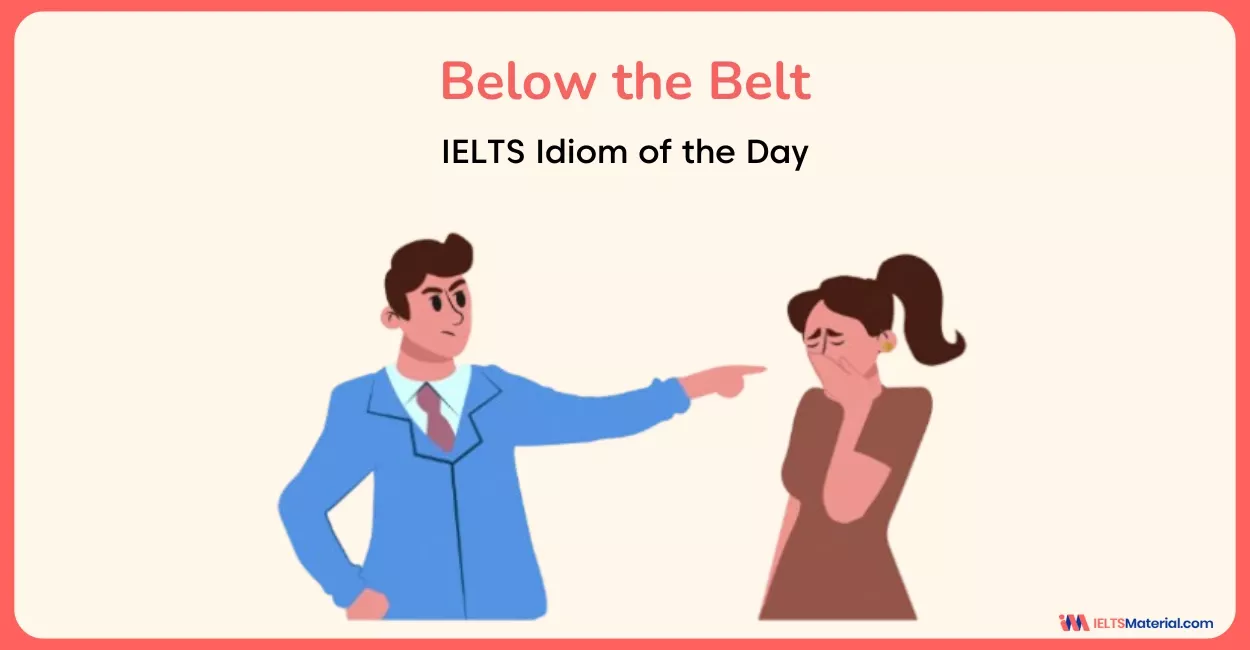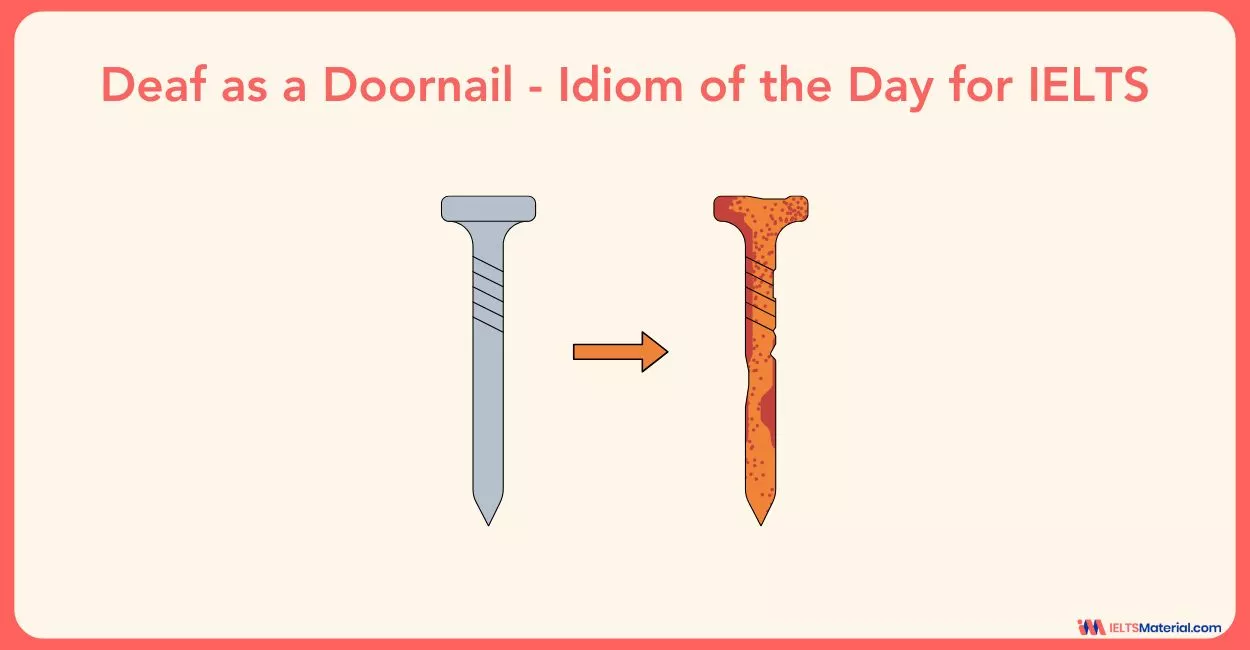Cash-flow Problem - Idiom of the Day for IELTS
The idiom 'cash-flow problem' means to have no available cash, even though one has assets or money invested; financial problem. This blog provides the meaning, origin, examples, & practice exercises for mastering the use of the idiom for an IELTS band 8+.
Table of Contents
- Cash-flow Problem Idiom: Meaning
- Origin of the Idiom ‘Cash-flow Problem’
- Cash-flow Problem Idiom: Examples in Everyday Usage
- Cash-flow Problem Idiom-Related Financial Phrases and Collocations
- Cash-flow Problem Idiom: Detailed Usage in IELTS Contexts
- Cash-flow Problem: Practice Exercises
- Cash-flow Problem: Answer Keys for Practice Exercises

Limited-Time Offer : Access a FREE 10-Day IELTS Study Plan!
In IELTS Speaking and Writing, the ability to talk about business, economics, and financial struggles can set you apart. Idioms can strengthen your lexical resource score, especially in IELTS Speaking Part 3 or Task 2 essays about money management, employment, or small businesses. One such phrase is ‘cash-flow problem’, a precise, real-world idiom rooted in finance that can express hardship without sounding vague or repetitive.
This blog explores the meaning, context, usage, origin, and application of the ‘cash-flow problem’ idiom for IELTS candidates targeting Band 7.0 or above, along with exercises and answer keys.
Cash-flow Problem Idiom: Meaning
A cash-flow problem refers to a situation where a person or business does not have enough available cash to meet immediate financial obligations, even if the business is profitable on paper. It usually implies temporary liquidity issues, not permanent failure.
This idiom can apply to personal finances, corporate management, or startup challenges, making it highly versatile in IELTS discussions on economics and work.
Origin of the Idiom ‘Cash-flow Problem’
The term, cash-flow problem, originates from accounting and finance, where cash flow refers to the net amount of cash being transferred into and out of a business. A cash-flow problem arises when outflows exceed inflows, often due to late invoices, high expenses, or seasonal revenue dips.
Unlike bankruptcy or insolvency, a cash-flow problem is typically short-term. However, it is a critical warning sign that demands immediate attention. This difference makes it a valuable phrase that can be used in academic or professional contexts in the IELTS exam.
Cash-flow Problem Idiom: Examples in Everyday Usage
Here are some example sentences to show how the cash-flow problem idiom is used in everyday situations and achieve a top IELTS band score:
- Many small businesses face cash-flow problems in their first year due to delayed payments from clients.
- “I’m having a little cash-flow problem. So, could I get an extension on this bill?”
- My real estate business has a temporary cash-flow problem.
- Due to his cash-flow problem, he was unable to pay his employees that month.
- Despite having many clients lined up, the startup had a serious cash-flow problem due to delayed payments.
- He admitted to experiencing a cash-flow problem while waiting for his paycheck.
Cash-flow Problem Idiom-Related Financial Phrases and Collocations
Given below are some phrases and common English words used in IELTS Speaking test related to the idiom, cash-flow problem.
|
Expression |
Meaning |
Example |
|---|---|---|
|
Tight budget |
Limited available funds |
We had to plan the wedding on a tight budget. |
|
Financial crunch |
Sudden shortage of money |
Many startups face a financial crunch before securing investments. |
|
Short on cash |
Not having enough money temporarily |
I was short on cash, so I skipped dinner at the restaurant. |
|
Income instability |
Irregular or unpredictable income |
Freelancers often deal with income instability. |
|
Delayed payments |
Late receipt of expected funds |
Cash-flow problems usually arise from delayed payments. |
Do you find it challenging to learn vocabulary on your own?
Join our IELTS online classes and boost your preparation for FREE!
Cash-flow Problem Idiom: Detailed Usage in IELTS Contexts
The idiom, cash-flow problem, is especially useful in Speaking Part 2 when describing problems, decisions, or financial situations, and in Part 3 discussions about business, economics, or education.
In addition, it fits naturally into topics on economy, business development, government funding, and personal finances. However, use idioms like this sparingly but precisely in your essay. It shows you understand both idiomatic language and topic-specific IELTS vocabulary.
IELTS Speaking Part 1 – Work
Q: What kind of job would you like to do in the future?
A: I’d love to run my own design studio, but managing finances is challenging, especially with cash-flow problems during slow months.
IELTS Speaking Part 2 – Describe a Time You Faced a Financial Difficulty
During my first year at university, I experienced a cash-flow problem when I had to pay for textbooks and rent at the same time. I was waiting on a scholarship payment, so I had to borrow money temporarily.
IELTS Speaking Part 3 – Business and Economy
Q: Why do many small businesses fail within the first year?
A: One key reason is cash-flow problems. Even if the business idea is solid, poor cash management can lead to delays in paying suppliers or employees.
IELTS Writing Task 2
Essay Topic: Some people think governments should support local businesses.
Sample Use:
Many small-scale entrepreneurs face recurring cash-flow problems, especially during off-seasons. Government-backed grants or loans could help them maintain stability during such periods.
Cash-flow Problem: Practice Exercises
Take up these exercises given below to master the correct usage of the idiom, cash-flow problem.
Exercise A: Which of the following scenarios represent a cash-flow problem?
1 A profitable company can’t pay salaries this month due to clients delaying payments.
2 A family overspends during a vacation and maxes out credit cards.
3 A man loses his job and becomes permanently unemployed.
4 A student receives a stipend only once every three months and struggles in between.
5 A freelancer has several clients but cannot pay rent this month because most payments are still pending.
6 A large corporation loses its biggest investor and goes bankrupt within weeks.
7 An NGO depends on grants paid annually and faces operational delays in March.
Exercise B: Transform the bland statements into more expressive ones using the idiom ‘cash-flow problem’.
1 The business had difficulty paying suppliers.
2 I didn’t have enough money to cover my bills last week.
3 Their company is doing fine overall, but they’re low on cash right now.
Wish you could impress your IELTS examiner with your vocabulary?
Begin with our Vocabulary for IELTS!
Cash-flow Problem: Answer Keys for Practice Exercises
Check your answers with the following answer key in order to determine whether you have grasped the meaning of the idiom 'cash-flow problem' or not!
Exercise A
- 1 (It is a clear case of a cash-flow problem because the company has income on paper but lacks immediate cash to cover essential expenses like salaries.).
- 4 (It is a cash-flow problem because the student has income, but it's irregular, leading to difficulty managing short-term expenses between payments.
- 5 (It is a textbook example of a cash-flow problem. The freelancer is earning money but doesn't have access to it when needed.)
- 7 (It illustrates a cash-flow problem, as the organization receives funding but not frequently enough to handle ongoing monthly expenses.)
Exercise B
- The business ran into a cash-flow problem and was unable to pay its suppliers on time.
- I faced a short-term cash-flow problem last week and struggled to pay my utility bills.
- Their company is financially healthy, but they’re currently facing a temporary cash-flow problem due to outstanding invoices.
To conclude, mastering financial idioms like ‘cash-flow problem’ gives you a linguistic edge in IELTS, especially for high-band answers. This idiom helps you communicate complex economic situations with clarity, whether you’re discussing business failure, budgeting, or resource allocation. So, to truly stand out in IELTS Speaking or Writing, move beyond basic vocabulary. Use expressions like this intelligently and naturally while taking IELTS Speaking practice tests, and always tailor them to the context. With consistent practice and precise usage, you will make your language sound fluent, professional, and exam-ready.
Useful Links:
- Time after Time - Idiom of the Day for IELTS
- Play It By Ear Idiom: Meaning, Origin, Usage & Exercises
- Let Yourself Go - Idiom of the Day for IELTS
- Pay through the Nose Idiom: Meaning, Origin, Usage & Exercises
- 25 Common Idioms in IELTS Speaking
- IELTS Vocabulary Words List for Band 8 or 9
- Practical Tips on How to Improve Vocabulary for the IELTS Exam
Explore IELTS Resources

Start Preparing for IELTS: Get Your 10-Day Study Plan Today!
Check out other Idioms

Haniya Yashfeen

Haniya Yashfeen
Recent Articles

Kasturika Samanta

Prity Mallick

Nehasri Ravishenbagam







Post your Comments